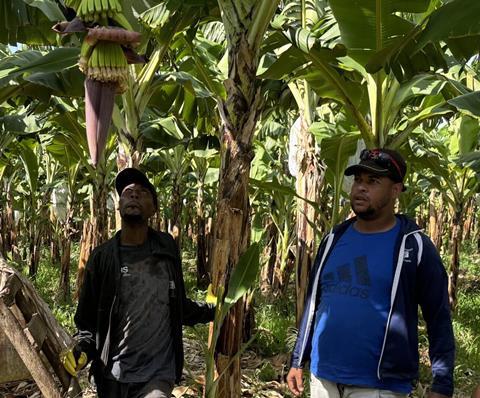Banana Link says country’s banana sector employs around 70,000 Haitian migrants, who currently face the threat of deportation under a government decree

UK not-for-profit cooperative Banana Link has joined unions and associations in Dominican Republic in calling for the regularisation of migrant workers in the country’s banana sector.
The Dominican banana industry, a major source of organic and Fairtrade certified bananas for Europe, relies heavily on labour from Haitian migrants, who plant, cut, care for and harvest the fruit. That labour is currently under threat.
“The banana workforce – around 80 per cent of which are of Haitian origin – is jeopardised by a government decree to deport 10,000 undocumented Haitian migrants per week,” Banana Link revealed.
In a joint letter, Banana Link, together with the National Banana and Agricultural Workers Union (SINTRAPBAA), the national trade union confederation CASC, migrant rights organisation Fundación Étnica Integral (LA FEI) and the Banana Producers and Exporters Association of Montecristi (ASEXBAM), demands specific measures to protect the Dominican banana industry and defend the human rights of workers.
“In particular, we call for urgent action to: renew expired migration documents of Haitian workers; thoroughly review the migration status of current detainees, ensuring that those who comply with regulations are not deported; and establish a streamlined regularisation programme, allowing Haitian workers to continue contributing to the Dominican economy without fear of deportation,” Banana Link stated.
The nation’s banana sector generates US$300mn a year in exports, employing an estimated 70,000 Haitian migrant workers directly.
Martin Peña, executive director of the Dominican Association of Banana Producers (Adobanano), said shortages of Haitian labour were already affecting packing and shipping operations.
According to local reports, Dominican exports to the UK have dropped from US$120mn to just US$67mn since 2016, with their market share falling by more than half. “A similar decline has occurred in other European markets,” Banana Link said.
“Since 2021, when president Jovenel Moïse was assassinated, Haiti has experienced a rapidly escalating security and humanitarian crisis,” the group explained. “In October 2023, in response to a dispute over water, the Dominican Republic closed its border with Haiti and suspended the issue or renewal of work, study or travel visas for Haitian nationals. A year later, in October 2024, the government announced a new migration policy: a target to deport 10,000 undocumented Haitian migrants per week.
“The massive deportations have resulted in labour instability that is jeopardising the agricultural industry and the country’s ability to meet its export commitments. At the same time, it is generating a climate of fear and anxiety on banana plantations.”
“The solutions put forward by signatories of the letter would not only avoid the paralysis of key productive sectors and protect national economic stability, but would also ensure the respect of human rights.”



